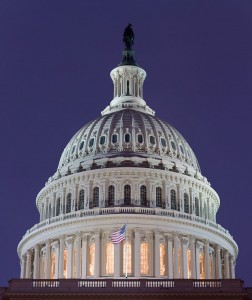
As night gathers in Washngton, the Capitol dome shines a beacon of total ignorance over the nation. (Photo by David Iliff/wikimedia)
In the past week, two organizations convened in Washington DC to discuss their view of the world. One, comprising some of the world’s most knowledgeable scientists, was the American Association for the Advancement of Science, holding its annual meeting. The other, made up of some of the world’s most powerful politicians, was the US Congress, assembled. They seemed to be discussing two widely separated, and wildly different, planets.
Dominating the list of topics discussed by the scientists were the imminent dangers to human survival posed by global climate change, pollution and the exploitation of natural resources. Among the points made during the presentations:
- The number of environmental refugees fleeing famines caused by climate change — already increasing dramatically from northern Africa into southern Europe — will soon reach 50 million, a volume that will threaten the stability of dozens of countries in the developed global North.
- Biodiversity — a measure of the health of the web of life that sustains human life — is under threat as never before from the combined effects of climate change along with “our needs for agriculture, fishing, housing, energy and water, combined with the pollution of vast areas of land and ocean and an insatiable demand for resources.”
- Overfishing of the world’s oceans has reduced the number of large, predatory fish by two-thirds and has likely condemned the next generation to a seafood diet consisting exclusively of sardines.
- The world might run out of productive agricultural land by 2050, thanks to rising global demand for food, biofuels, and forest products, along with land degradation and urbanization.
- “Meeting the food needs of a still-growing human and domestic animal population with less water while preserving remaining biodiversity is, arguably, the most profound challenge of the 21st century.”
- Climate change could increase exposure to and risk of human illness originating from ocean, coastal and Great Lakes ecosystems, with some studies projecting impacts to be felt within 30 years.
- “Over the last couple of generations, there has been a huge amount of groundwater pollution worldwide, and this has had a negative impact on our drinking water supply.” “This contamination has had a pervasive impact on the environment. It is still out there, and it needs to be dealt with.”
- Researchers reported on their study of the residents of the Kuril Islands, one of the most rugged environments in the world, because “understanding what made residents stay and how they survived could inform how we adapt to modern vulnerabilities, including climate change. The findings also have implications for how we rebound from contemporary catastrophes, such as the Indonesian tsunami in 2004, hurricanes Katrina and Rita and last year’s earthquake in Haiti.”
- “Climate change is already having an effect on the safety of the world’s food supplies and unless action is taken it’s only going to get worse.”
Meanwhile, a few blocks away, the US House of Representatives completed its work on a continuing resolution whose ostensible purpose was to allow the government to continue to operate in the absence of a budget, but which actually began the work of recreating the government in the image of the Tea Party. This single bill:
- slashed the budget of the U.S. Environmental Protection Agency by one-third;
- restricted the agency’s efforts to reduce carbon dioxide and other global warming pollutants from coal-fired power plants and oil refineries (a regulatory program that began January 2);
- prevented the EPA from restoring Clean Water Act protections to many of the nation’s most vulnerable waterways, including those that feed into drinking water supplies for more than 117 million Americans;
- prevented the Agency from regulating toxic air pollutants such as mercury;
- cut funds for curbing greenhouse gas emissions including carbon dioxide, methane, and hydrofluorocarbons;
- prohibited the setting of any new health standards limiting coarse air particles;
- prohibited the Environmental Appeals board from reviewing or rejecting permits for off-shore drilling;
- eliminated funding for the Council on Environmental Quality, which coordinates environmental policy among all federal agencies;
- banned any contribution by the United States to the Intergovernmental Panel on Climate Change.
It was the best of times, it was the worst of times. At one end of Pennsylvania Avenue, the best minds on the planet told each other what they had learned about its mortal peril, and the Herculean measures needed to save it; at the other end, the people responsible for the health and welfare of the American people ushered in a new Dark Ages, drawing the curtains of ignorance tightly around them to shield them from the lights of knowledge that were burning brightly, but briefly, just a few blocks away.
(See also, “Nightfall in America.”)